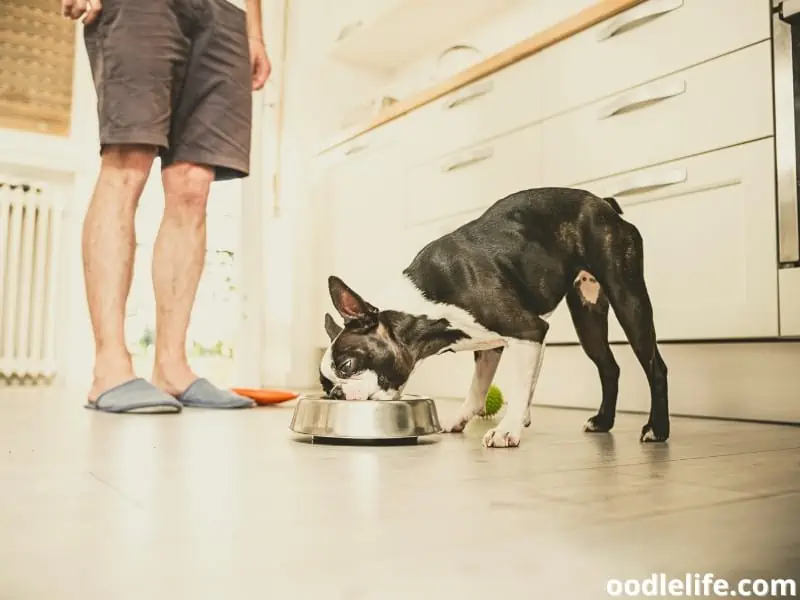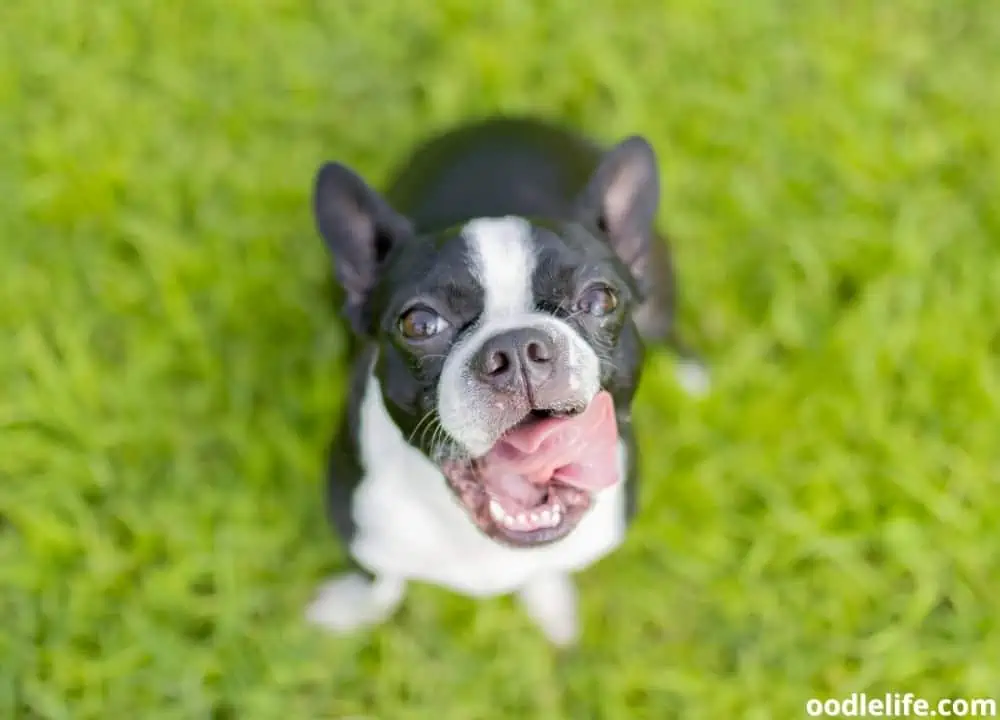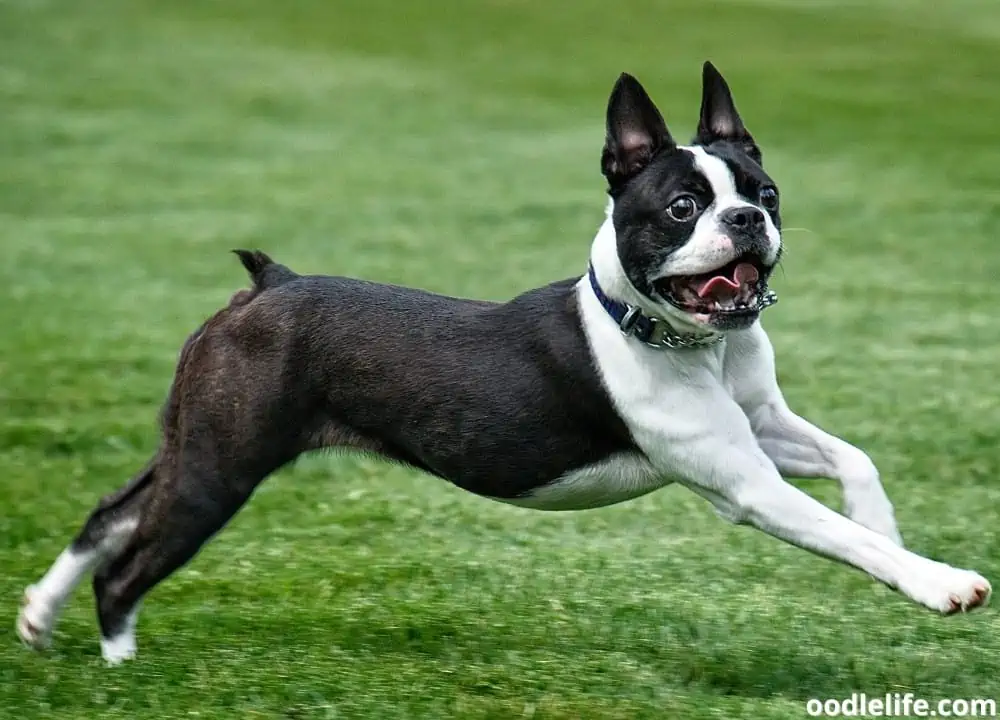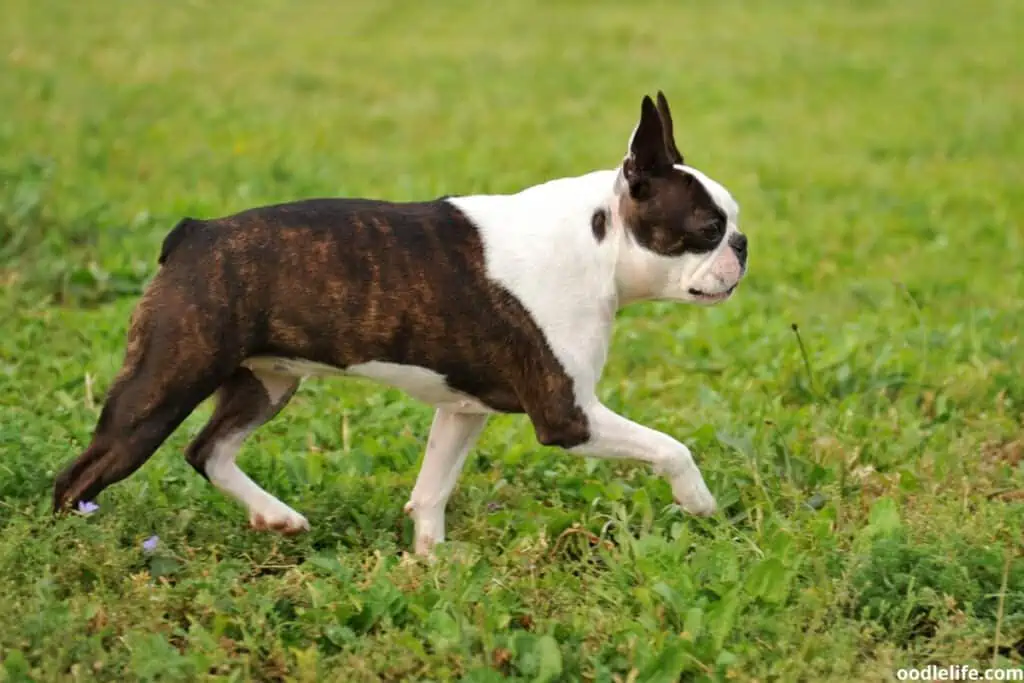Why Does My Boston Terrier Fart So Much?
A common question among Boston Terrier parents is, why does my Boston Terrier fart so much? This issue shouldn’t be a cause for concern since Boston Terriers are known for farting a lot or being gassy.
The primary reason for Boston Terrier flatulence is because they are brachycephalic dogs. These dogs usually have a short snout that is a little bit inward and a small face. This shape affects their breathing as they take in more air, which they take out through farting.

Learn more about why your Boston Terrier farts so much and how you can reduce it.
Why Do Boston Terriers Fart So Much?
Other than being a brachycephalic dog, there are other reasons why your Boston Terrier farts a lot, as discussed below. They fart, they drool, and they breathe heavily.
Eating Human Food
Table scraps or human food may create digestive problems for your Boston Terrier. Some of these foods are hard to digest, more so those with a lot of sugar and fats, generating more gas in your dog’s stomach.
If you must give your dog human foods, ensure they are rich in fatty acids and other essential nutrients. Please never give your Boston Terrier spicy food.

Food Allergies
Food allergies cause skin irritation and excessive gas in your dog’s digestive system, leading to extreme farting. It is essential to know the food types that are allergic to your Boston Terrier and try to avoid them.
Boston Terriers can be allergic to the following foods:
Some Terriers might be sensitive to grains such as soybeans, rice, corn, and wheat.
Eating Carbohydrates
Boston Terriers find it difficult to digest carbohydrates, leading to more gas in their tummy. These include less digestible meat products and soluble, fermentable fibers. Such carbs ferment when they get into the dog’s digestive tract.
The fermentation process leads to gas production, causing your Boston Terrier to release it through farting. Carbohydrates don’t have any nutritional value for dogs; hence try to avoid them as much as possible.

Introducing a New Diet Suddenly
Changing your dog’s diet suddenly can upset their stomach, leading to farting. Give your Boston Terrier 25% of the new diet and 75% of the old diet for the first week. Increase the percentage to 50% in the following weeks until the dog gets used to the new food.
Diseases
Are you still asking “why does my Boston Terrier fart so much?” Certain health conditions like Gastrointestinal (GI) disorders can make your Boston Terrier have a gassy tummy. GI disorders prevent proper nutrients absorption in the intestines.
For instance, inflammatory bowel disease (IBD) fills the GI tract with inflammatory cells, changing the intestines’ environment and disrupting the good bacteria or normal microflora. As a result, bacterial overgrowth inhibits the intestines from absorbing nutrients, leading to symptoms like vomiting, weight loss, diarrhea, gassiness, protein loss, and loss of appetite.
Other causes of excessive gas in your Boston Terrier are parvovirus and giardia parasites that prevent the intestines from taking in nutrients as required. Certain antibiotics can also kill or destroy good bacteria, resulting in a gassy stomach.

Not Pooping Enough
If your Boston Terrier lacks enough opportunity or time to poop, they will have no option other than holding bowel movements, causing pressure in the GI tract. The gas usually comes out through farting.
It’s advisable to monitor your Boston Terrier’s pooping frequency. The frequency goes hand in hand with the amount of food you give your dog. The more food your dog takes, the higher the pooping frequency.
How to Reduce Boston Terrier’s Farting?
Even though Boston Terriers are prone to farting, it doesn’t mean you can’t do something to minimize this issue. The following are some of the things you can do to reduce Boston Terrier flatulence.
Feed Your Dog a Healthy Diet
It‘s vital to feed your Boston Terrier protein-based food and fewer carbohydrates.
Choose raw food over processed ones like dry kibbles. If you must give your furry friend processed food, give them small amounts.
The best alternatives for your Boston Terrier are bone broth, boiled turkey, and vegetables such as carrots, squash, cucumber, and celery.
Ensure you don’t give your dog rice as it is a complex carbohydrate. Rice might ferment in your Terrier’s GI tract. Also, avoid feeding your Boston Terrier with beef because it irritates the GI tract, creating more gas. Bland diets should only be for short periods. Make sure you don’t overfeed your dog.

Exercising Regularly
Ensure your Boston Terrier exercises every day for at least 30 minutes. Workouts may involve running around or long walks to keep fit. Overweight dogs fart much more than dogs with the right weight.
Exercises also help your dog digest food properly and improve overall body function. In the end, bowel movements become regular, and no gas develops in your Boston Terrier’s tummy.
It is typically not difficult to get the energetic (and even hyper) Boston Terrier to do some exercise.

Slow Down Speed-Eaters
The way your dog eats can lead to flatulence. If your Boston Terrier eats very quickly, the more air he will take in, and it will get out through farting.
Give your dog food in a puzzle toy or feeder bowl to slow down the eating habit. Besides, ensure your Boston Terrier is in a relaxed environment while eating to get rid of stressors.
If you have two or more Terriers, let them not compete to eat. Avoid food competition by serving each dog in a separate bowl.
Give Your Dog Enough Time to Poop
Ensure your Boston Terrier has adequate potty time, at least once after every meal. Releasing waste can reduce gas in the stomach, which minimizes farting.

Keep Your Dog Away From Trash
Keeping your Boston Terrier from trash will reduce farting. While on a nature walk with your dog, keep an eye on what they put in their mouth.

Use Ginger and Peppermint Oil or Leaves
Ginger and peppermint oil or leaves are natural remedies for Boston Terrier farting. Ginger has antioxidants that help relieve nausea, bloating, motion sickness, and other gastrointestinal problems.
Adding peppermint oil or leaves to your Boston Terrier’s food helps soothe their upset tummy. Ensure you use peppermint in small quantities since too much of it can be toxic.

Consult a Veterinarian
Seek medical help from the veterinarian if your Boston Terrier has excessive flatulence. The farting could be due to other gastrointestinal problems like irritable bowel syndrome, inflammatory bowel disease, intestinal parasites, pancreatitis, or cancer.
For dogs with pancreatitis, ensure you add digestive enzymes to their food. You can also add probiotics since they are good bacteria required by your dog’s digestive tract.

Wrap Up
So, why does my Boston Terrier fart so much? The primary reason why Boston Terriers fart more is that they are brachycephalic dogs. Their snouts are structured differently, allowing more air intake when these dogs eat.
Such air can only be passed out via farting.
Other reasons for excessive Boston Terrier farting include:
- Eating a lot of carbs
- Over excitement and air gulping during swimming
- Feeding on human food
- Inflammatory bowel disease and other GI infections
- New diet
- Infrequent pooping